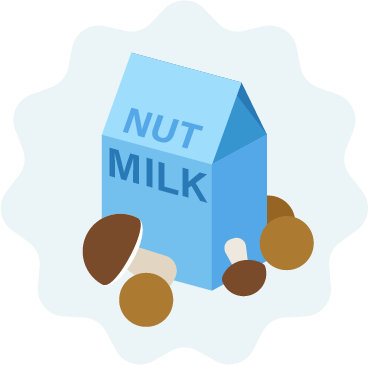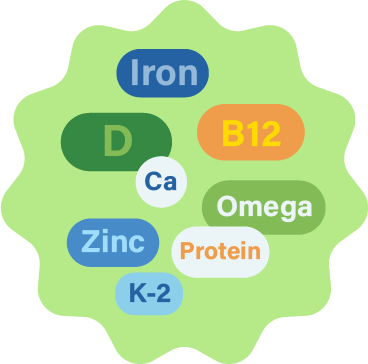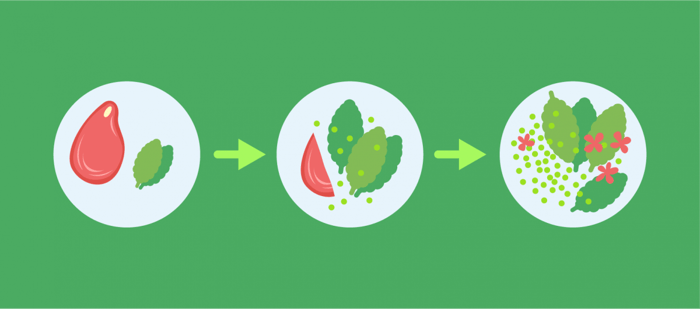Table of Contents
There’s no better time to make the switch to veganism than right now! With an abundance of resources and plant-based options available, we'll guide you on how to go vegan step by step.
Chronic health issues like heart disease and obesity are prevalent in our healthcare system, largely driven by poor dietary choices. Additionally, our dietary habits significantly contribute to environmental damage, affecting oceans and the earth.
Regardless of your motivation, one fact is clear: our current eating practices are unsustainable. Embracing veganism is a powerful step towards safeguarding both our health and the planet. It's no surprise that a growing number of individuals are choosing this path.
The journey of going vegan might seem overwhelming at first, but with the right guidance, it's a rewarding and enlightening experience. Dive into our step-by-step guide to learn everything you need to know about embracing a vegan lifestyle.
What Is Veganism?

Veganism embodies a lifestyle that goes beyond a plant-based diet to exclude all animal-derived products. The dietary aspect of veganism entails abstaining from meat, dairy, fish, eggs, and honey, among other animal products.
The realm of veganism also spans several subsets, each with its unique focus. For instance, raw vegans adhere to a diet comprising solely of uncooked plant-based foods, while Low-Carb High-Fat (LCHF) vegans aim to minimize carbohydrate intake alongside eliminating animal-derived foods.
The ethos of veganism often extends beyond dietary choices to other aspects of life. A quintessential vegan lifestyle also avoids the use of animal-derived materials like leather, fur, and wool in textiles, advocating for a compassionate and sustainable lifestyle.
Why Go Vegan?

Veganism is gaining momentum for a myriad of compelling reasons, each resonating with different individuals based on their personal values, health aspirations, or environmental concerns.
For many, the pivot to veganism arises from a moral stance against the inhumane treatment of animals in conventional livestock farming. Others are drawn to a vegan lifestyle due to religious beliefs or the allure of numerous health benefits.
Some noteworthy health advantages of adopting a vegan diet include:
- A boost in cardiovascular health marked by better cholesterol levels and lower blood pressure.
- An effective avenue for weight management courtesy of a plant-rich diet.
- A potential reduction in chronic inflammation and a fortified defense against certain cancers.
Beyond personal health, an increasing number of individuals are embracing veganism as a conscientious choice to mitigate climate change. The prevailing agricultural practices, geared towards satiating the global meat appetite, are significant culprits of greenhouse gas emissions.
The resource-intensive nature of animal farming exacerbates the strain on our planet's finite resources. Hence, opting for a vegan lifestyle is a profound step towards reducing one's ecological footprint. The burgeoning vegan movement holds promise in rallying a collective effort to combat climate change and foster global environmental sustainability.
How To Become A Vegan

Transitioning to veganism doesn't translate to a monotonous diet of bland salads; it’s a journey filled with a vast array of delicious and nutritious foods. The path may seem daunting initially due to prevailing misconceptions, so let’s set the record straight and ease into the vegan lifestyle with an informed perspective:
1. Achieving a Nutrient-Rich Vegan Diet:
The concern of a nutrient-deficient vegan diet is common among newcomers. Rest assured, a well-planned vegan diet can fulfill all your nutritional needs with a bounty of plant-based foods.
2. Supplementing Wisely:
While a vegan diet is robust, certain nutrients predominantly found in animal products may require attention. Key nutrients include protein, iron, omega-3 fatty acids, and Vitamin B-12. Fortunately, a variety of vegan-friendly supplements are available to ensure a balanced nutrient intake.
3. Unmasking Hidden Non-Vegan Ingredients:
Beyond the obvious like meat and dairy, some everyday items harbor animal-derived ingredients. For instance, certain dyes originate from insects, while gelatin in some desserts is derived from animal collagen. Some alcoholic beverages also utilize animal products during processing. Mastering label-reading skills is crucial to navigate the grocery aisles with vegan confidence.
4. Dissecting the Vegan ≠ Healthy Myth:
Although ditching animal products is a stride towards healthier living, not all vegan products epitomize health. Many commercially available vegan foods are heavily processed, which can eclipse the health merits of a plant-based diet and potentially inflate your grocery expenses. Embracing whole plant foods like fruits, vegetables, grains, and nuts predominantly will cultivate a healthier vegan lifestyle.
Transitioning To Veganism

Ready to embrace a compassionate lifestyle by going vegan? Transitioning from an omnivore to a vegan might seem like a leap, but with the right approach, it becomes a delightful journey of discovery. Here are some tailored tips to ensure a smooth and mindful transition into a plant-based lifestyle that sticks:
1. Ease into the Green Realm:
A sudden shift to veganism can work for some, especially if you're already treading the vegetarian path. However, if you're new to the plant-based paradigm, a gradual transition might be more sustainable.
- One Step at a Time: Consider phasing out animal products gradually. Perhaps start with eliminating red meat, followed by poultry, and so on. This staggered approach makes the transition less daunting.
- Meatless Mondays: Dedicate specific days for vegan meals. Meatless Mondays are a popular choice, offering a structured yet gentle introduction to plant-based eating.
- Vegetarian Vestibule: Before diving into veganism, you might want to explore vegetarianism. It’s a less restrictive avenue that could serve as a stepping stone to a fully plant-based diet.
- Savor the Favorites: If there’s a non-vegan food you adore, save its elimination for the last. In the meantime, hunt for a vegan substitute that satiates that particular craving.
The pace of your transition is a personal endeavor. It's not a race but a journey toward a more conscious lifestyle. Remember, every small step counts, and each one takes you closer to a compassionate, plant-based lifestyle.
2. Embrace Abundance, Not Scarcity:
A common hurdle aspiring vegans face is the notion of 'giving up' certain foods. It's easy to perceive veganism as a restrictive choice that narrows down your food horizons. However, the truth is, embarking on a vegan journey can significantly broaden your culinary spectrum!
Before you begin phasing out animal products, immerse yourself in the vibrant world of plant-based foods. Each week, introduce a nutrient-dense vegan superfood to your palate - be it acai berries, flaxseed, or the humble seaweed, every addition is a step toward a nutrient-rich vegan diet.
- Explore New Recipes: Dive into the plethora of vegan recipes available online and in cookbooks. Experiment with wholesome ingredients like whole grains, seeds, nut butters, and tempeh. The variety is endless and the flavors are bound to surprise you!
- Discover Plant-based Proteins: Explore the myriad of plant-based protein sources. From lentils and chickpeas to tofu and seitan, there's a whole new world of protein-packed foods waiting for you.
- Try Vegan Alternatives: As the plant-based movement burgeons, the market is flooding with vegan alternatives for meat, cheese, and other dairy products. These alternatives replicate the texture and taste of animal products, making the transition smoother.
- Cultivate a Food Adventure Mindset: Adopt an exploratory mindset and relish the new textures, flavors, and dishes you encounter. The vegan culinary landscape is rich and diverse, waiting to be explored.
By celebrating the abundance of nutritious and tasty options available, you’ll realize that going vegan is not about deprivation but about discovering new foods and flavors. As you delve deeper into the plant-based realm, the foods you once relied on might just fade into the background, making room for new favorites.
3. Discover the World of Vegan Substitutes

Transitioning to a vegan diet doesn’t mean you have to bid farewell to your cherished recipes. In fact, with a little creativity, you can "veganize" your favorite meals by swapping in plant-based alternatives. This way, you can retain the essence of the dishes you love while aligning with your new dietary choice. Here's how:
- Meat Alternatives: Mushrooms and jackfruit are excellent for replicating the texture and heartiness of meat. Explore other substitutes like tofu, tempeh, or seitan for a protein punch.
- Milk and Cream Replacements: Nut milks like almond or cashew milk, and oat milk are creamy, flavorful substitutes for dairy milk and cream. They work well in everything from your morning coffee to savory sauces.
- Butter Alternatives: Swap out butter with vegetable oils such as olive or coconut oil in your cooking. For a buttery spread, there are numerous vegan butters available in the market.
- Cheese Substitutes: Nutritional yeast offers a cheesy, savory flavor that can replace cheese in many recipes. Additionally, there’s a growing variety of delicious vegan cheeses made from nuts, soy, and root vegetables.
- Egg Replacements: For baking, consider using flaxseeds or chia seeds mixed with water as a binding agent instead of eggs. Commercial egg replacers are also a viable option.
Familiarize yourself with these vegan staples and experiment with them in your recipes. By making these simple swaps, you'll find that you can still enjoy the essence of your favorite dishes while transitioning smoothly into a vegan lifestyle. The key is to stay open to experimentation – you might just discover new favorites along the way!
4. Embrace the Journey and Address Criticism Positively
 Transitioning into a vegan lifestyle, especially in a meat-centric culture, can invite a fair share of comments and advice, not all of which will be supportive or constructive. It's a shift that might spark curiosity or even resistance from those around you. Here’s how to navigate this aspect of your vegan journey:
Transitioning into a vegan lifestyle, especially in a meat-centric culture, can invite a fair share of comments and advice, not all of which will be supportive or constructive. It's a shift that might spark curiosity or even resistance from those around you. Here’s how to navigate this aspect of your vegan journey:
Prepare for Opinions: Upon sharing your choice to go vegan, you might encounter unsolicited opinions or advice from well-meaning friends, family, or colleagues. Understanding that this is a common reaction can help you approach such situations with patience and grace.
- Stay Confident in Your Decision: It's essential to stand firm in your decision and the positive reasons behind your transition to veganism. You're making a choice that aligns with your values, be it for health, ethical, or environmental reasons.
- Educate and Share: One way to break down misconceptions is by educating others about the benefits of veganism. Share delicious vegan meals with friends and family to showcase the variety and satisfaction a plant-based diet can offer. It's a delightful way to introduce them to veganism and maybe even inspire them to explore it further.
- Seek Supportive Communities: Surround yourself with supportive individuals or join vegan communities online or locally. Engaging with like-minded individuals can provide encouragement, share experiences, and offer valuable advice as you navigate your vegan journey.
Remember, every person’s journey to veganism is unique. Stay positive, open to learning, and remember that the transition is a personal growth journey. Over time, the criticisms may lessen, and your confidence in your vegan lifestyle will only grow stronger.
5. Reconnect with Your 'Why' to Stay Inspired
Transitioning to a vegan lifestyle is a marathon, not a sprint. As with any significant life change, there will be moments of temptation or doubt. Here's how to keep your motivation robust:
- Reflect on Your Initial Motivation: Whenever you find your determination wavering, take a moment to recall why you embarked on this path. Was it for personal health, ethical reasons, environmental concerns, or a combination? Revisiting your initial motivations can reignite your passion and resolve.
- Adopt a Growth Mindset: It's natural to have slip-ups along the way. Instead of dwelling on them, view them as opportunities for learning and growth. Reflect on what triggered the slip, learn from it, and move forward with renewed commitment.
- Celebrate Your Progress: Celebrate the milestones, no matter how small. Whether it's discovering a new vegan recipe, noticing health improvements, or reaching a certain number of days, weeks, or months on your vegan journey, acknowledging your progress can boost your morale.
- Engage with the Community: Connect with other vegans who can provide support, share their experiences, and celebrate your journey with you. Engaging with a supportive community can reignite your motivation and provide fresh perspectives.
- Educate Yourself Continuously: Stay inspired by reading books, watching documentaries, and following vegan influencers who align with your values. Continuous learning will deepen your understanding and passion for veganism.
Remember, transitioning to veganism is a profound commitment to enhancing personal health and contributing to a more sustainable planet. Keeping your 'why' at the forefront of your mind can help navigate challenges and keep you inspired on your vegan journey.
Supplements To Consider When Going Vegan
 Transitioning to a vegan diet eliminates certain food groups, which may require some nutritional adjustments to maintain a well-rounded diet. Here are some supplements that might help fill any nutritional gaps:
Transitioning to a vegan diet eliminates certain food groups, which may require some nutritional adjustments to maintain a well-rounded diet. Here are some supplements that might help fill any nutritional gaps:
- Vitamin B12: Essential for nerve function and the production of DNA and red blood cells.*
- Vitamin K-2: Important for bone health and heart health.*
- Protein: Crucial for muscle building, repair, and overall growth.*
- Vitamin D: Promotes bone health, immune function, and mood regulation.*
- Iron: Vital for transporting oxygen throughout the body.*
- Zinc: Supports immune function, wound healing, and DNA synthesis.*
- Omega-3 Fatty Acids: Important for heart health, brain function, and inflammation reduction.*
- Calcium: Essential for bone health, muscle function, and nerve signaling.*
When shopping for supplements, ensure they are vegan-certified to avoid ingredients like gelatin or other animal-derived substances. For instance, opt for algae oil supplements as a vegan-friendly alternative to fish oil supplements for your omega-3 needs.
Always consult a healthcare professional before introducing new supplements to your regimen, especially if you have pre-existing health conditions or are on medication. Furthermore, consider consulting a dietitian or a certified nutritionist specializing in vegan diets to tailor a nutritional plan that meets all your dietary needs while adhering to vegan principles.


